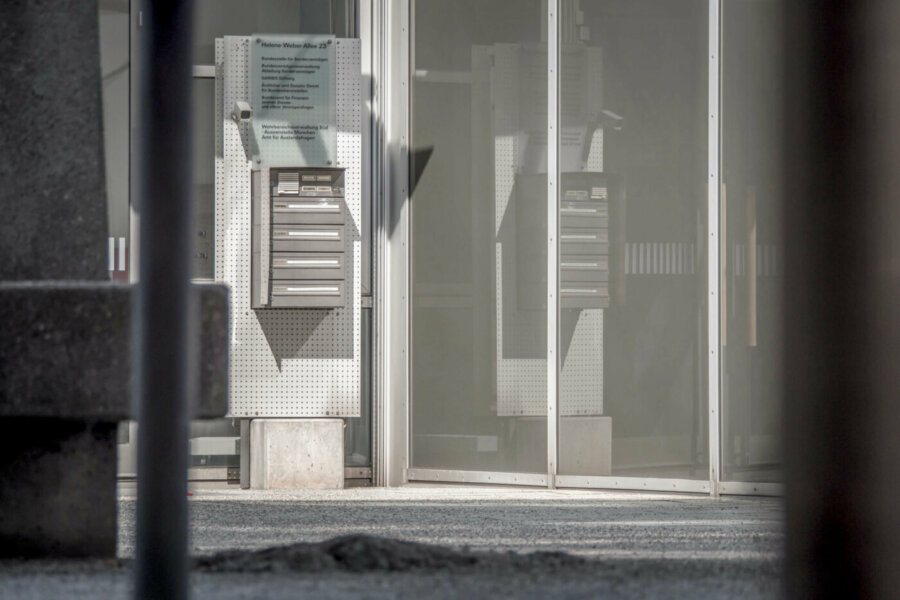It was almost noon. Franz, who I had met up with earlier that morning, was leading me through the streets of a Munich neighborhood a bit far from the center. We walked side by side on wide, calm sidewalks, passing just a few people. It was already really hot. Finally, Franz pointed out a beige building, slightly hidden behind a few trees. There’s one here, he told me.
There wasn’t much to see, an overly ordinary building among other overly ordinary buildings on an overly ordinary street. A building of no determinable age, neither modern nor old. A cream-colored façade, blandly neutral.
Almost opposite, a contemporary building, slightly more interesting with its glassed-in stairwells, embodying the neighborhood’s atmosphere quite well: presumably nothing of note to see here. You can’t even see much on Google Maps. Its blurred façade leads to a virtual dead end. OpenStreetMap describes the street as residential; and that’s the reigning impression. Residential. Not administrative, commercial or industrial. And yet, this beige building and this gray building didn’t bring housing to mind; but they certainly didn’t seem administrative, commercial or industrial. Just buildings you pass without wondering about their function. Maybe because of how calm the neighborhood is. A woman with a stroller walked past us.
Franz led me to the building with the glassed-in stairwells. Four gray mailboxes under a security camera and a plexiglass plaque welcomed us. On the plaque, inscriptions stretched on like only the German language knows how. And as the camera examined us, Franz began translating them. He told me that some meant nothing and encouraged me to buzz up. Federal Office of Special Property. Federal Administration, Department of Special Property. Federal Bureau of Financial Services, Central and Active Case Services. I hesitated. The camera was still on us. These titles were clearly intended to prevent this sort of action. Buzz up? To say what? If no one feels concerned by the activities taking place somewhere, why would anyone try to approach?
I resigned myself to leaving the premises without seeing more, and asked Franz if he himself had ever dared to buzz up. He replied that he hadn’t, but that since he had already come to take photos, they undoubtedly already knew who he was.
We parted ways, planning to meet up again at 3pm for the rest of the tour.
On the neighboring square, I approached a produce vendor’s cart, getting a laugh out of him when I asked if he could open the two avocados I had just bought, since I was unequipped for a picnic. He took out a long knife that made the two of us laugh harder, but the other customer didn’t crack a smile. I was really hungry and the bench under the trees just nearby beckoned me as the perfect spot to beat the increasingly stifling heat.
I took advantage of the reigning calm to make a few calls, lowering my voice when a woman came up and sat down just next to me. Deep in conversation, I didn’t realize the absurdity of the situation right away: several shady benches lined the square, but she had come and sat down just next to me. After hanging up, I turned my head her way, ready to strike up a conversation. But nothing. She sat straight, incredibly straight, knees together, a plastic bag likely full of magazines in front of her legs. I looked at her for a minute without lingering, but with a smile on my face inviting her to speak to me. Otherwise, why had she sat down just next to me?
But nothing. Every time I glanced at her, she averted her gaze. But as the minutes passed I noticed that she would look at me every time I looked elsewhere. So I started to observe her more closely.
And I noticed her peculiarity. Her hair, which didn’t seem to move, as though it were starched. Her sunglasses, which, even in profile, seemed way too big for her. The straightness of her posture. Her jaw, which, in how she insistently set it, seemed too square for such a slight woman. I finished my avocado, slightly disconcerted by her presence, packed up my things and got up. Her lips didn’t so much as twitch.
I took a few steps toward the trashcan, threw away the remains of my avocados and discreetly looked at her one last time.
I saw that she had gotten up and seemed to be coming toward me once again. She stopped. I wasn’t sure I was heading in the right direction but decided to keep going. I couldn’t figure out whether the situation was funny or worrisome. But my hotel seemed like a better place to decide. I walked along the long hedge lending a slight charm to this street decidedly devoid of any apparent interest, slightly concerned all the same about the turn that events might take.
I decided to reassure myself, and took advantage of a break in the hedge to turn off and around without being seen. It all seemed ludicrous to me. My worrying was most likely ridiculous. This woman who reminded me in appearance of the people who gave anonymous accounts on the talk shows I sometimes watched as a child. The very goal of my trip to Munich—visiting the city not with my usual map but with one drawn up by Franz, listing 125 spots that had been or still were offices or facilities of the BND, the German Federal Intelligence Service.
I saw that she was following me.
To be continued.
Aude Launay
